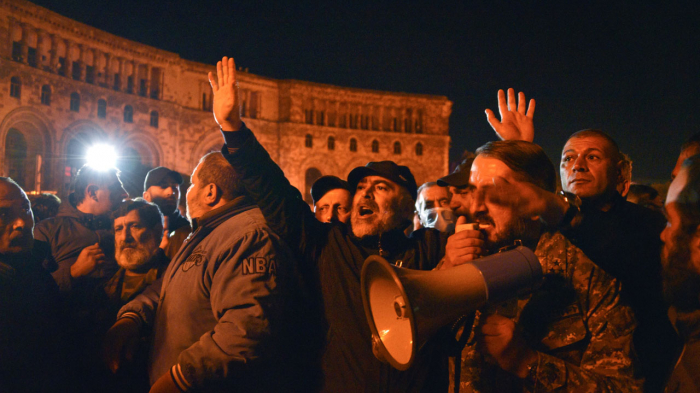Hundreds of Armenians broke into government buildings in the capital Yerevan in protest at the decision of Prime Minister Nikol Pashinian to stop the fighting in Nagorno-Karabakh.
He should leave, and the agreement should be annulled," the protesters were shouting.
On November 9, Russian President Vladimir Putin, Azerbaijani President Ilham Aliyev and Armenian Prime Minister Nikol Pashinyan signed a joint statement on a complete ceasefire in Nagorno-Karabakh since 00:00 Moscow Time on November 10. The Russian leader said the Azerbaijani and Armenian sides would remain on the positions they hold, while Russian peacekeepers would be deployed to the region. Besides, Armenia and Azerbaijan should carry out the exchange of prisoners of war and the bodies of those killed.
The Armenian Defense Ministry and the General Staff said Tuesday that the national armed forces will abide by the agreement, calling on the nation to refrain from actions that destabilize the situation in the country. Armenian President Armen Sarkissian said Tuesday that political consultations were underway to discuss the situation that emerged after the agreement was signed.
Following over a month of military action to liberate its territories from Armenian occupation, Azerbaijan has pushed Armenia to sign the surrender document. A joint statement on the matter was made by Azerbaijani president, Armenia's PM and the president of Russia.
A complete ceasefire and a cessation of all hostilities in the zone of the Nagorno-Karabakh conflict is introduced at 00:00 hours (Moscow time) on 10 November 2020.
Armenian Armed Forces launched a large-scale military attack on positions of Azerbaijani army on the front line, using large-caliber weapons, mortars and artillery on Sept. 27. Azerbaijan responded with a counter-offensive along the entire front.
Back in July 2020, Armenian Armed Forces violated the ceasefire in the direction of Azerbaijan's Tovuz district. As a result of Azerbaijan's retaliation, the opposing forces were silenced. The fighting continued the following days as well. Azerbaijan lost a number of military personnel members, who died fighting off the attacks of the Armenian Armed Forces.
The conflict between the two South Caucasus countries began in 1988 when Armenia made territorial claims against Azerbaijan. As a result of the ensuing war, Armenian Armed Forces occupied 20 percent of Azerbaijan, including the Nagorno-Karabakh region and seven surrounding districts. The 1994 ceasefire agreement was followed by peace negotiations.
More about: Azerbaijan Armenia
















































